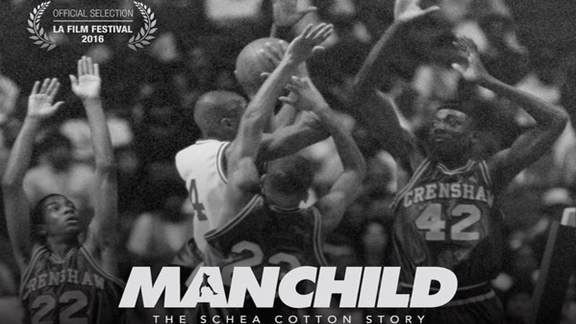
We were glad to offer this photo from our archives for promos of the “Manchild: The Schea Cotton Story” documentary. It was a feature film at the 2016 L.A. Film Festival after playing at the NBA All-Star Game in Toronto.
Long-awaited basketball documentary about former St. John Bosco and Mater Dei basketball standout Schea Cotton finally premiers after long production. “Manchild” is a story about a young basketball phenom who did not reach the NBA after many concluded it was a foregone conclusion. The documentary focuses on Cotton’s youth exploits and upbringing, his battle with the NCAA and attempts to explain how his career got sidetracked.
Related: California’s Top Eighth Graders Since 1982 | Schea Cotton: Legend in his time
Watching the “Manchild” documentary at the Los Angeles Film Festival in Culver City, it was clearly evident this film was a long-time in the making. Just based on the attire and look of some of the subjects, including Cal-Hi Sports Managing Editor Ronnie Flores, it was evident some of the interviews were shot years ago.
Time does indeed pass by and it’s hard to believe 20 years have passed since San Pedro, Calif. native Vernon “Schea” Cotton was dominating the SoCal basketball scene and was arguably the biggest name in basketball — high school, college or pro — in the second largest city in the country. It’s also ironic the film took years to complete because Cotton’s story took years to unravel and for a long time basketball fans have wanted to know, “what happened?”
Many prominent athletes give their testimony to Cotton’s ability and their version of what went wrong with his career — including Tyson Chandler, Randy Moss, Baron Davis and Elton Brand, among others. The most poignant and powerful moments in the film, however, revolve around the comments of Schea’s parents — father James Cotton Sr. and his doting mother Gaynell Cotton.
Cotton Sr., who passed in 2014 during the making of the documentary, has some choice words about what derailed his son’s basketball career. “Big James” squarely places the blame on the NCAA — the organization the Cotton family sued in October of 1998 over Schea’s SAT score that the NCAA — not the organization that administered the test (the ETS) — eventually invalidated. After missing his senior season at St. John Bosco of Bellfower, Schea intended to attend Long Beach State University to play for one season with his older brother James Cotton Jr. That plan changed when Cotton Jr. decided to declare for the 1997 NBA Draft. Schea asked for a release from his letter on intent and planned to attend UCLA, but right before classes were to start for the fall semester the NCAA did not accept his qualifying score because of special accommodations the ETS allowed for his learning disability.
Schea told Cal-Hi Sports long ago that his senior season shoulder injury and the years he lost playing in a Bruins uniform were the turning points in his career. By Schea’s own admission and from the comments of others, his seemed to lose some of the confidence and passion to continue to improve his game while fighting for the right to play at a D1 college. Schea even touches on the point where he thought about ending the battle — and his life.
Cotton finally gained his NCAA eligibility in the fall of 1999, but by then it seemed the course of his career had already been severely altered and he was roughly the same size — 6-foot-5, 215-pounds — with the same skill set he had in leading Mater Dei of Santa Ana to the CIF D1 state title his sophomore season. In many respects, after Magic Johnson announced he was HIV positive and before Kobe Bryant and Shaquille O’Neal joined the L.A. Lakers in the fall of 1996, Cotton was Southern California’s most talked-about and scrutinized basketball star. It was a lot to handle for a teenager and his mother reiterated that point on many occasions in the documentary.
Gaynell didn’t appreciate how the NCAA handled her son’s investigation and admitted the media publicity was too much, too soon for her son — particularly a Sports Illustrated spread in its July 25, 1994 issue. She felt her son’s life began to spiral out of control after that, but in reality he was already known nation-wide. His career was chronicled in the Cal-Hi Sports Newsletter, Student Sports Magazine, and publications such as the Los Angeles Times for years before that.
Director Eric ‘Ptah’ Herbert did an excellent job piecing together the puzzle of Schea’s life with powerful testimonials, the production quality was excellent, and the transitions were quality. A couple of areas the documentary could use shoring up in are introducing Schea to a non-basketball viewing audience because the narrative is powerful enough for the casual sports fan and explaining Cotton’s potential pro shortcomings from the perspective of NBA brass who were around during the time frame he went undrafted in 2000.
There were many forces at play in Cotton’s downfall (some which were explained better than others in the doc) and the eight years between Schea’s enrollment at St. John Bosco as California’s most hyped youth prospect ever and declaring for the NBA Draft after one year at Alabama ended up being gut-wrenching with some highs and plenty of lows. Schea’s strong family bonds seemed to be what allowed him to overcome the disappointment of a NBA career that never materialized.
At the conclusion of the premier, Herbert and Schea had a quick Q-and-A session with the viewing audience. The documentary’s protagonist summed up “Manchild” best when he said, “This is not a basketball story, but a humanitarian one.”





7 Comments
Any idea where this film will be shown in the future?
It’s in the process of being being signed for distribution. Any updates and I’ll give them here or on Twitter: @RonMFlores
Interested in seeing the film, will it be available to see soon?
It’s in the process of being being signed for distribution. Any updates and I’ll give them here or on Twitter: @RonMFlores
Any update on when this will be distributed or available for purchase online?
You can view the documentary from this link https://geni.us/MANCHILD
Just saw this and it was excellent I never knew of this story my ignorance but glad I did .A story every dreamer in sports should see.